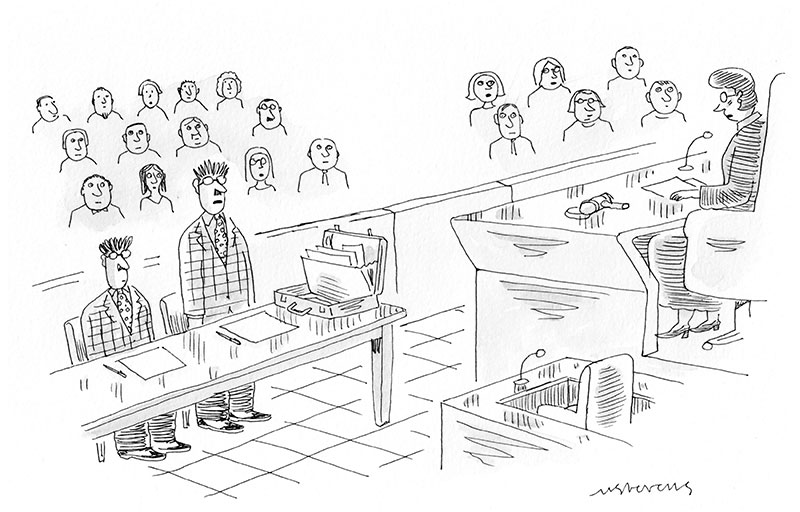 Here we have a courtroom scene from Mick Stevens. The judge is on the bench and looking at two men at the defense table. They appear to be identical, and they’re wearing the same plaid suits. One of them is standing, speaking to the judge, and therefore delivering the line that must address both the courtroom setting and the fact that the speaker is representing (or co-counseling a case with) his exact double.
Here we have a courtroom scene from Mick Stevens. The judge is on the bench and looking at two men at the defense table. They appear to be identical, and they’re wearing the same plaid suits. One of them is standing, speaking to the judge, and therefore delivering the line that must address both the courtroom setting and the fact that the speaker is representing (or co-counseling a case with) his exact double.
My first few captions referenced pro-se litigants, who actually do represent themselves:
- “I’m representing myself.”
- “I’m appearing on my own behalf.”
- “My client is self-represented.”
Representing one’s self in court is never a good idea. In the words of Abraham Lincoln, “He who represents himself has a fool for a client,” a quote that inspired my next two captions:
- “I do not, Your Honor, care for the adage about lawyers who represent themselves.”
- “I have a fool for a client.”
Because the lawyer who’s speaking appears to be representing or working with his doppelganger, I focused on captions that play on the word “double” while addressing legal principles:
- “My double’s in jeopardy.”
- “My double handles indemnity.”
My last caption targets lawyers who are still surprised to find women on the bench: “You know what’s even more peculiar? A lady judge.” Very few such lawyers still exist, but in my twenty-eight years as an attorney I’ve litigated against a couple, and they look like the guy in this drawing.
Now, on to your captions…
Many included the words “your honor.” Both words, however, should be capitalized because “Your Honor” is a formal title used as a direct address. That may seem unimportant, but this contest was created and is being judged by the guy who used to be an editor at The New Yorker.
That said, there were a lot of outstanding entries this week, and most came at the drawing from angles I never considered. Let’s first, however, look at the captions that were similar to mine. Many went after the pro-se joke, and the best two were:
- “Your Honor, I’ve chosen to represent myself.”
- “Your Honor, I’d like to represent myself.”
Several of you referenced Lincoln’s opinion of self-represented litigants, and the best was, “It appears that I have a fool for a client.”
One of you put a nice twist on the phrase lawyers traditionally open with when presenting an oral argument: “May it amuse the court.” (I don’t want this blog to read like an application for a copy-editing position, but the word “court” should be capitalized because it refers to the judge presiding over the case.)
Several of you made a “beside myself” joke, and the best was the shortest: “Your Honor, I’m beside myself.” Other captions highlighting the identical appearance of the two men at the defense table included, “I believe I can speak for both of us.”
Another strong entry—“As the court can see, this suit is not without precedent”—would be better without the first five words, which nearly double the caption’s length for no purpose. That’s why I prefer this version of the same joke: “This suit is not without precedent.”
Many of you referenced a “mistaken identity” defense:
- “The witnesses’ description of my client’s appearance could apply to anyone, Your Honour.”
- “Your honor, the defense will show that this case comes down to a simple case of mistaken identity.”
- “Not guilty your honor. It’s an obvious case of mistaken identity.”
- “What we have here, your honor, is a simple case of mistaken identity.”
- “Your honor, my client will argue this is a case of mistaken identity.”
I like the first caption a lot, which I assume came from a British entrant given the spelling of “Honour.” Not only is “Your Honour” properly capitalized, but I love the implication that there could be many people who look exactly like the lawyer and his client. Nevertheless, this caption does not end with the punchline the way the other captions do. “Mistaken identity” is a stronger ending than “Your Honour.”
Here are several fine entries that reference the charges against the defendant:
- “My client pleads not guilty to impersonating an attorney.”
- “Your Honor, does my client look like a plagiarist?”
- “Copycat? Yes. Killer? No.”
- “It was a crime of fashion, your honor.”
That last caption—an all too rare example of a good pun—has one fatal flaw: it ignores the fact that the two men at the defense table look exactly the same.
That’s not a problem with any of the following nine captions, all of which I really like:
- “We’ll be representing Xerox in this case, Your Honor.”
- “The statute of imitations applies here, your honor.”
- “He’s messing with you. I’m the defendant.”
- “This case combines two criminal suits.”
- “We also have matching briefs.”
- “Your honor, we both are here regarding the same suit.”
- “Your honor, at the risk of appearing duplicitous…”
- “Objection, Your honor! I’m not the one on trial here.”
- “As you can see, your honor, my client is easily influenced.”
Choosing a winner out of such a strong and large pool is not easy, but I’m going with, “Copycat? Yes. Killer? No.”



